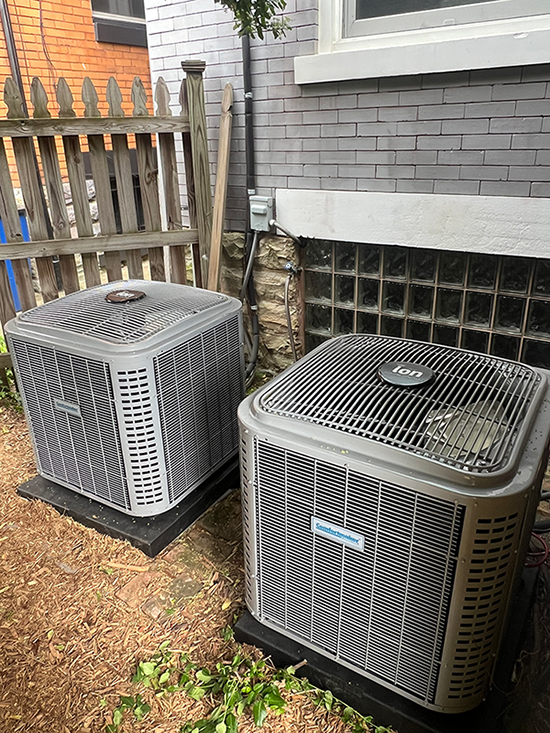Looking to replace AC in a residential building? When faced with purchasing a new air conditioning (AC) unit, many property owners and managers may feel overwhelmed.
But replacing your AC can be a breeze if you’re prepared. This guide serves as a resource for property managers and owners. It outlines key factors to consider when determining whether to repair or replace an air conditioning unit.
Make an informed decision about replacing an AC unit. Explore common warning signs indicating when it may be time for a new AC. Get insight on finding the right HVAC contractor to get the job done right. Learn how to improve cooling and home comfort at your property with a new efficient unit.
Signs an Air Conditioner Needs Replaced
Temperature fluctuations and increasing humidity levels. Rattling or buzzing sounds. Frequent repairs. These are all warning signs that may indicate its time to replace your AC.
Shifting Temperature and Humidity Levels
As AC units age, they may struggle to maintain consistent indoor temperatures. Are some rooms in the home too warm while others have cool air? Do interior humidity levels climb even when the air conditioner is running? Shifting temperature and rising humidity inside the home could indicate an AC unit is no longer working properly.
Buzzing or Rattling Noises from the Unit
An air conditioner should operate quietly. Buzzing or rattling noises coming from either the indoor or outdoor unit may indicate operational issues. This could be caused by a failure with internal parts. Replacing the compressor, motor, or fans could be necessary.
Frequent Repair Issues
Regular maintenance and AC tune-ups can help limit repairs. If constant repairs are needed despite regular maintenance, there may be a bigger issue. It may be time to replace the AC if repair issues occur frequently.
- Breakdowns: Repair calls to fix or replace expensive parts on an AC unit can add up in cost and cause stress. It may be beneficial to purchase a new air conditioning unit if repair calls are consistent.
- Rising Energy Bills: Are your utility bills rising? Older systems tend to consume more electricity than newer models designed with energy savings in mind.
- Obsolete Refrigerants: Some older AC units use refrigerants like R-22 (Freon). Replacing an air conditioning system with a newer model using eco-friendly alternatives can help improve efficiency.
Deciding whether to repair or replace AC depends on several factors. It may be time to replace an air conditioning system if experiencing any of the above issues. A new AC unit can improve indoor comfort and provide energy savings.
To Repair or Replace AC?
When deciding whether to repair or replace your AC, consider the age of the unit. Repair costs and cooling performance are also factors to keep in mind. A useful rule-of-thumb calculation involves multiplying the age of the current AC unit by its estimated repair cost. If this figure exceeds $5,000, then a replacement may be recommended.
Age of AC Unit
Most well maintained air conditioners typically last between 15-20 years. When an air conditioner reaches this milestone, it’s time to start considering a replacement. It is important to note that other factors can decrease the lifespan of a unit. These include extremely hot or humid climates and frequent use of the system.
Routine Maintenance
Routine maintenance can help extend the life of an AC unit. Change filters regularly, monitor temperature settings, and schedule professional tune-ups. A regularly maintained central air conditioner should last for a minimum of 10 years without major issues.
Cooling Performance and Energy Savings
An air conditioning system should keep a consistent temperature. If the unit is not running correctly, it can lead to more energy being used. Replacing an older system with a modern AC unit can provide cost and energy saving benefits.
Enhancing Existing AC Units with Add-Ons
Uncertainty about cost may be keeping you from replacing an AC unit. Add-ons can help improve an AC unit’s effectiveness. Programmable thermostats can improve temperature control. Dehumidifiers can help maintain comfort and boost AC cooling performance.
Programmable Thermostats for Improved Temperature Control
Programmable thermostats are easy to use. They improve the comfort of living space and are an affordable way to upgrade an existing AC system. Temperature can be adjusted and controlled based on a daily schedule and cooling preference.
Programmable thermostats don’t just maintain temperature, they maximize energy efficiency by only cooling the building during the hours that it’s occupied. Reducing energy consumption can lead to lower bills. This helps property owners and managers save money and cut down on costs associated with utilities.
Dehumidifiers Enhance Indoor Comfort
A dehumidifier works with an AC unit to remove excess moisture in the air. It also helps to maintain an indoor atmosphere that feels cooler. Mold growth and other issues related to excess moisture can be prevented by keeping humidity levels under control.
Benefits of AC Unit Add-Ons
AC unit add-ons can help an air conditioning system work better. Consult with a trusted HVAC contractor to determine the options best suited for your needs. The benefits of AC unit add-ons include:
- Budget-Friendliness: Both programmable thermostats and dehumidifiers are relatively affordable options compared to AC replacement.
- Compatible: These add-ons are generally compatible with most existing AC units, making them an easy and practical upgrade.
- Energy Savings: Improved temperature control and reduced humidity levels can lead to lower energy consumption and, in turn, lower utility bills.
The Role of HVAC Contractors in Replacing AC Units
Professional HVAC contractors play a vital role in replacing AC. They can evaluate the condition of a current AC system. This assessment will help determine whether an air conditioning unit is worth repairing or replacing.
Assessing the Condition of an AC Unit
An experienced HVAC contractor will inspect the current AC unit. They will consider many factors including age, performance, energy used, and general wear-and-tear. This assessment will help the HVAC technician make an informed recommendation on AC repair or replacement.
Installing a New Air Conditioning System
The cost to replace a new air conditioning system is based on several factors. These include the size of an existing condenser unit, property size, insulation, window types, and local climate conditions. A comprehensive evaluation, repair checklist, or overview of the AC replacement process may be provided prior to installation.
- Sizing: If possible, prior to the property inspection, provide the HVAC contractor with details of the current unit. Include the height, width, and depth. Energy Star offers sizing guidance. This can help with an initial calculation for AC replacement.
- Unit Type: There are four main types of air conditioners. These include central air, window models, mini-split systems, and portable units. Look into the Seasonal Energy Efficiency Ratio (SEER) for guidance on the best choice. The tax credit for specific SEER-rated AC units can help you save money if you decide to replace your AC.
- Ductwork Inspection: The HVAC contractor will inspect ductwork before installing a new AC unit. During inspection, they will check for leaks or damage. Issues with ductwork should be repaired before AC replacement.
- Airflow Adjustments: An HVAC expert can adjust room registers, balance the system, and test fan speed to improve the airflow throughout a home.
- Refrigerant Charging: Proper refrigerant charging is crucial for cooling performance. An experienced contractor will ensure the new AC unit has the correct amount of refrigerant based on manufacturer specifications.
Preparing for an HVAC Appointment
When it’s time to replace an AC unit, being prepared can help make the installation process run smooth. It is helpful to prepare the property in advance of an HVAC appointment. This will help the technician gain access to a clear area to complete an AC repair or replacement job quickly. Sharing detailed information about the current AC unit can also help the technician diagnose problems with the existing system faster.
Clear Obstructions Around the Outdoor Unit
Adequate space for easy access to the outdoor unit during installation or maintenance is important. Before an appointment, remove any debris, plants, or other objects obstructing the area. This will allow the technician to work efficiently.
Provide Easy Access to Indoor Components
In addition to clearing an area outside, make sure there is easy access to indoor components including vents and thermostats. Move furniture and other items away from the area where the technician will be working. Provide enough room for them to maneuver. If necessary, consider temporarily relocating pets or children who may cause a distraction while the technician is working.
Share Existing Details About the AC Unit
Provide details about the AC unit’s type, age, maintenance history, and any past performance issues. Sharing this information can help the HVAC contractor diagnose issues. It can also save time and money by helping them identify the root cause of the issue faster.
- Type of System: Be prepared with information about the type of air conditioning system currently installed. For instance, is the existing AC system a window unit or central air conditioning?
- Age: Identify the age of the current AC unit. This can help determine whether a repair or replacement is necessary.
- Past Issues: If possible, provide a brief history of past problems with AC operation or parts that were replaced. This will assist the HVAC technician with diagnosing potential issues that exist.
- Maintenance Records: Maintenance documents can give AC technicians a better understanding of the system’s condition and performance history. When making an appointment, share maintenance records and repair documentation.
Are You Ready to Replace Your AC?
Getting ready to replace your AC? An air conditioning replacement requires preparation, an understanding of the installation process, and maintenance for the best performance. A modern AC system can offer improved indoor comfort and energy efficiency.
Professional HVAC contractors are essential for AC unit decisions. Consult with a professional HVAC contractor to make an informed decision about repairing or replacing an AC unit. They will assess the unit’s age, performance, and energy efficiency. This evaluation can help decide if an existing air conditioner should be repaired or replaced.
JDC Heating & Cooling is committed to providing reliable HVAC services including quality AC replacement in Pittsburgh and the surrounding areas of Mount Lebanon, West Mifflin, Belle Vernon, and Washington, PA.
From AC installation and routine maintenance to emergency service and indoor air quality improvements, we provide quality HVAC service in Pittsburgh and the nearby areas.
Contact us today for help with any of your air conditioning needs.


